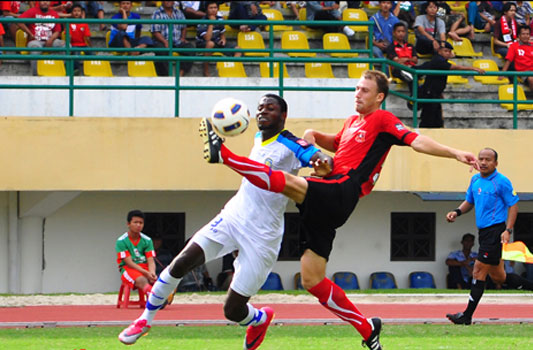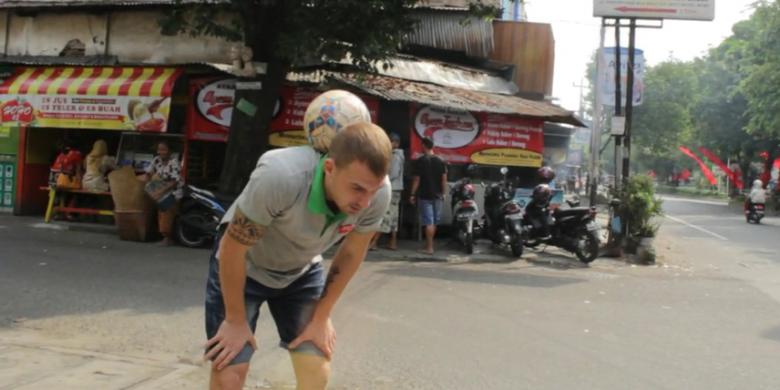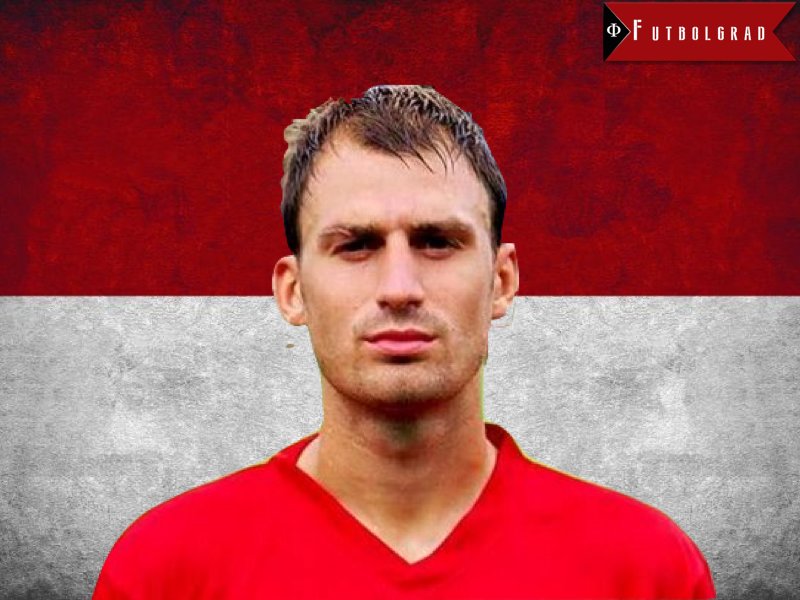By Ruli Endepe Alfaizin –
“Aku ora opo-opo (I’m alright)” was his answer whenever he was asked about his condition.
Sergey Litvinov is not your typical player. The Russian is neither as popular as his Russian compatriot Andrey Arshavin nor as strong as one of CSKA Moskva’s Berezutskiy twins. Whoever plays Football Manager 2008 and chooses to manage in the Russian Football Premier League (RFPL) knows that he was the central defender of Luch-Energiya Vladivostok.
In 2011 Litvinov attempted to revive his career by trying his luck playing football outside his country and chose a newly founded club Ksatria XI Solo FCr. There, Litvinov played alongside four legionnaires: the Australian Macedonian goalkeeper Aleks Vrteski; the Australian midfielder David Micevski; and two Serbs, Stevan Račić and Žarko Lazetić, who played up front for the club.
Soon after Litvinov’s Arrival the LPI Faced Major Problems
Soon after his arrival in Indonesia,however, the league faced a major problem, in that, during the first half of the 2011 inaugural season Liga Primer Indonesia (LPI), the Indonesian Football Association (PSSI) issued orders to dissolve the league and to ban both of the teams, their players, and the officials of LPI.
The Indonesian FA had been against the league since its inception because the competition was seen as a threat to the existing Indonesian Super League (ISL). The LPI which was founded by oil tycoon Arifin Panigoro, who challenged the then-president of the Indonesian FA at the 2011 congress, was considered a rebel league that threatened the Indonesian FA—especially as FIFA only allows one first tier competition for each association member. His action was, however unsuccessful.

Sergey Litvinov playing in Indonesia – Image by Kontakt.com
In order to safeguard the status of the Indonesian FA, stern action was taken after the formation of a new Indonesian FA board. The LPI was abolished, and LPI clubs were obliged to merge with or sell their shares to already existing clubs from ISL or to clubs below the top division—as a result many LPI clubs faced dissolution.
At the end of 2011 season, Solo FC found itself in 14th place among 19 teams after winning only 4 games and losing 10. The management of Solo FC and Persis Solo, therefore, decided to merge the two clubs and to initiate an open trial for all players already in the squads of both clubs, including the foreign players.
Litvinov is a Product of Luch-Energiya
Unfortunately for Litvinov, he was forced out of the club despite the fact that he was one of the fans’ favorite players. Litvinov, who is the son of a military officer and a dentist, was born in 1986 in Posyet Khasan, a village located in the Primorsky Krai. At the age of five he started to play football and also took sambo, a Russian martial art. Later, he joined the Akvalain Football Academy in Vladivostok. Then, in 2005 when he was 19, he was signed by Luch-Energiya.
A year later in 2006, Luch-Energiya was promoted to the Russian Football Premier League (RFPL), and as part of the promotion, Luch-Energiya had to send a team to the Russian Reserve League. For Litvinov, this increased his chance of one day playing in the RFPL. In 2007, Luch’s manager at that time, Sergey Pavlov, called him up to the main squad for the game against Rubin –but he was not used in the game.
Then in June 2007, he tore his meniscus and cruciate ligament, which required surgery in Moscow,and subsequently, because of this injury, the management decided to not extend Litvinov’s contract. He then had to leave the squad and continue his recovery (which included a second operation in Khabarovsk) on his own. He then asked the Executive Director of Luch, Ali Ibadov, to be allowed to train with the U-21 squad until the end of 2008 season..
In 2009, he joined Okean Nakhodka to compete in the Russian Second Division Zone East. A year later, he travelled to Yakutsk to play for ShVSM Yakutsk, who did not pay his salary for two months. He then left the club and flew back to his hometown and months later he had a short stint with FK Belogorsk in the Amur Oblast Competition.
“First of all, the conditions are totally different. Second, of course it is the financial condition. I don’t want to play at ‘swamp’ as in Okean or Yakutsk. And thirdly, I always wanted to play abroad,” Litvinov told Primfootball.ru.
Adventure and Money Attracted Litvinov to Indonesia
The attraction of adventure and the need of money then led him to travel to Indonesia. After he had been unattached for six months, a reformatted league club, Persikab Bandung Regency offered him a contract for the second half of the Indonesian Premier Division, a second division football competition at that time.
After the breakup of LPI and the formation of the new Indonesian FA board, a brand new league with similar name to the previous rebel league was created—the Liga Prima Indonesia/Indonesian Premier League (IPL)—and was declared to be the legal football league in Indonesia. In other words, the ISL, which was previously the officially recognized league, was now suddenly the breakaway league.
After playing for only half of the 2011-12 season for Persikab, Litvinov was able to help the team to survive for the next season. The club, which consisted mostly of local players, had played poorly throughout the season as they had managed to win only five games and had conceded 25 goals in the 18 games. Persikab finished in 9th place out of 10 clubs in Group 2.
At the end of the season, all of the players were released. It is customary in Indonesia to release the team after the league is finished and to arrange a trial to form a new team shortly before the next season starts.
Indonesian Football is in Constant Crisis Mode
While all this was happening, the losing side of the previous FA board election created disturbances and thereby managed to overthrow the general secretary and force the vice president of the FA to resign, and placed their own men into the vacant positions. They even created a counterfeit Indonesian National Football Team named The Real Garuda while the official national team was competing in ASEAN Football Competition 2012. They re-recognized the Super League as the legal league of the country while also recognizing the Premier League pyramid, thereby creating two official leagues in the country.
Both of the leagues were to start on January 2013 and through the further legislation, the Super League was the only recognized league in Indonesia in 2014. This political unrest in football certainly harmed Litvinov—and all the clubs and players—who had to wait for at least six more months before he could join a club.
PSLS Lhokseumawe, a club based in Aceh, was his next destination. The 2013 season went badly for IPL clubs as many teams ran out of money in the middle of the competition, and one-by-one declared bankruptcy and resigned from the league. The league operator then stopped the competition and ran a playoff round for the remaining clubs.
The misfortune for Litvinov did not stop there, however, as PSLS failed to qualify for ISL and the management did not pay his salary for six months. He then left the club, flew to Jakarta, and called both the Indonesian FA and the players union but got no satisfying response.
The Indonesian FA Ignored Litvinov’s Case
The Indonesian FA ignored his report. He flew back to Surakarta with no club and a friend offered him a place to stay as well as a temporary job. Litvinov worked as a juice seller and asked for no money from his employer. In addition to selling juice, he also worked as a model for local fashion shops.
A local agent mishandled his visa extension while he played for Persikab Bandung which left him without a passport or money. Litvinov later told Eurosport that his passport was later returned without a new visa.

Sergey Litvinov showcasing his skills in the streets of Indonesia – Image by Kompas
While he waited for his salary to be paid, his wife contacted him and asked for a divorce. When he ran out of money, help came from a number of people. A man from East Java raised a fund for him, but unfortunately, since had he overstayed his visa by almost a year, he was deported in July 2014—PSLS have still not paid the outstanding salary of $9500.
He told one national newspaper that he felt so lucky to be able to going home alive even though did not bring money back. He was clearly referring to the Diego Mendieta’s case. Mendieta had once played for Persis Solo in the 2011-12 season. His former club owned Mendieta $12,500 after his contract expired in 2012. He then became ill with cytomegalovirus and due to lack of funds was forced to choose between either paying for hospital care or buying a ticket to Paraguay. He died on December 3, 2012, in a hospital in Surakarta.
Shattered dreams, unpaid wages, being deceived in a strange land—football’s dark side has been illustrated in Litvinov’s case—and this is but a single snapshot. Everyone dreams of playing in the Champions League, but less than 1% achieve that dream. Some players just dream to get a contract extension at the end of the season, while others merely hope to be paid on-time—or to be paid at all.
This was a cautionary tale of football in Indonesia, but the problem of unpaid players and organized crime in football is widespread . As the most popular sport in Indonesia, football should be well managed. Many clubs, however, do not pay players for months and are not prosecuted. Unfortunately, although the cases of Mendieta, Litvinov, and local players have surfaced, the Indonesian FA seems to be giving little attention to this habitual problem.
Being born and raised in a football family in Malang, Indonesia, Ruli chose CSKA Moscow as his favorite team since he saw them win the 2005 UEFA Cup. His interest in history has led him to dig up any information and stories about both the Russia and Soviet national team and CSKA since the pre-Bolshevik era. To make CSKA and Russian football more popular in Indonesia, he created an account on Twitter @CSKAMoskwaIDN




















COMMENTS